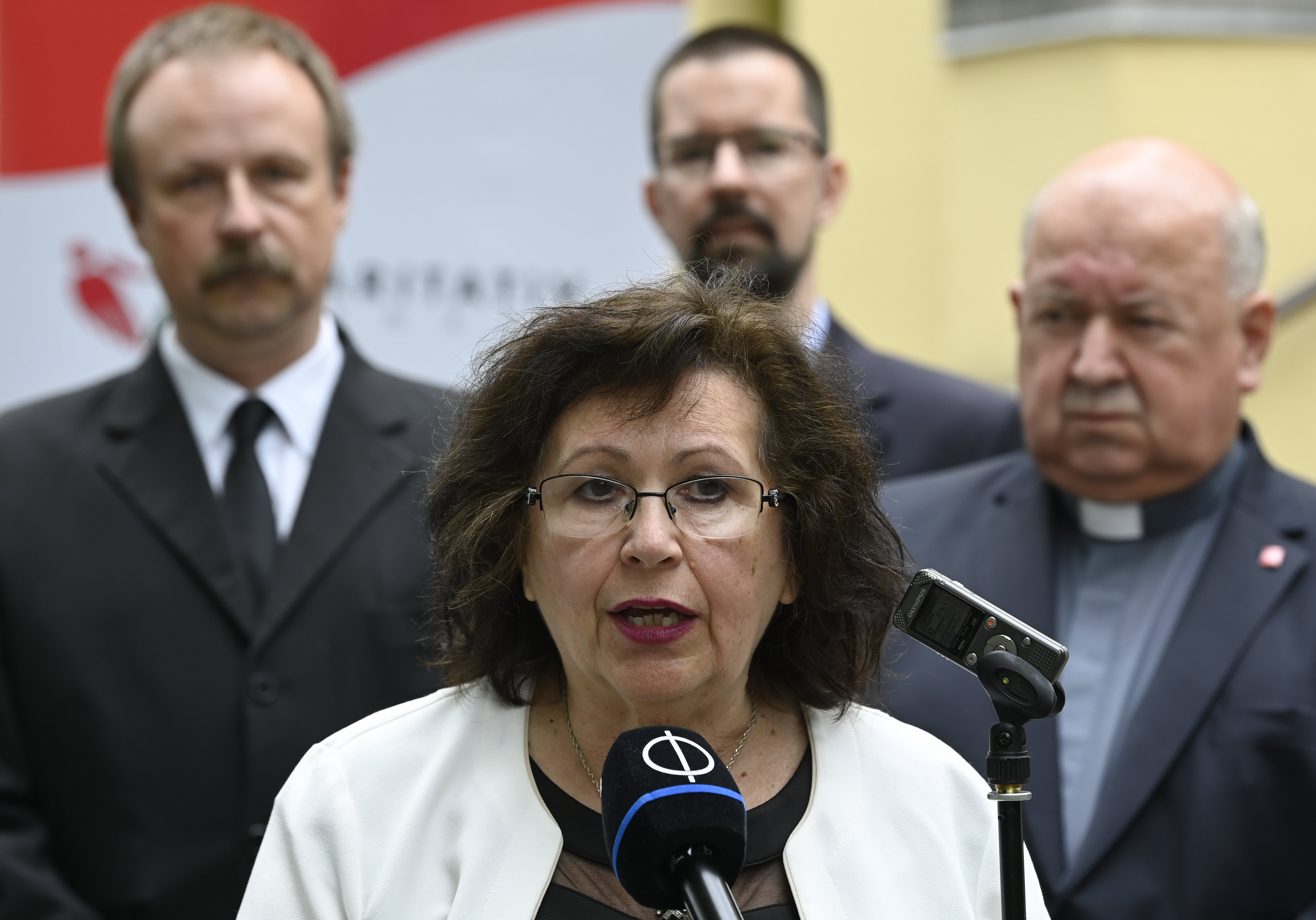Wine, not Weapons, as Hungary Gets to Keep its Pipeline Oil

Polish nationality spokesperson Maria Rónayné Ewa Slaba speaks at a ceremony before the departure of a Hungarian consignment of eucharistic wine for Ukrainian Christian communities in front of the Polish Parish Church of the Virgin Mary of All Help in Budapest on May 30, 2022. Donated by the Archdioceses of Eger and Veszprém and the Archabbey of Pannonhalma, the nearly 500 liters of liturgical-quality wine were collected by the Hungarian Catholic Charity. It will be transported by the Ministry of Foreign Affairs and Trade to Poland, from where the Polish Charity will deliver it to Ukraine.
Photo by Tamás Kovács / MTI
In the early hours of May 31, after the first day of an EU summit in Brussels, Prime Minister Viktor Orbán said in a post on Facebook that European Union leaders had agreed to allow deliveries of Russian oil via pipeline with unchanged conditions.
“We brokered an agreement that states that those countries that get oil delivered via pipeline may continue managing it under the old conditions,” Orbán said. European Council President Charles Michel confirmed the deal when announcing that EU leaders had agreed on a sixth package of sanctions against Russia.
“Concretely, it will allow a ban on oil imports from Russia with a temporary exception for imports delivered by pipeline,” he said.
Earlier at the summit, Orbán had said that applying an embargo on Russian oil exclusively delivered by sea, not pipeline, would be a “good solution” for Hungary. However, he stated that if pipeline supply were to be interrupted, Hungary would need access through other means.
“The pipeline solution is not bad [.…] it’s a good approach, but we need a guarantee that in the case of an accident with the pipeline [running] through Ukraine [….] we have to have the right to get Russian oil from other sources,” he said.
According to the Association of Hungarian Logistics Service Centers (MLSZKSZ), Hungary could take over the transshipment of as much as five million tonnes of Ukrainian grain by rail were the immediate infrastructure investments to be made. The association estimates that Ukraine’s grain exports could reach 20 million tonnes a year, all of which must be delivered by rail since the country’s port access has been inhibited by a Russian blockade.
Logistical Upgrade
Upgrading cross-border railway and transshipment infrastructure in Hungary through central budget and EU resources to create a corridor for Ukraine’s grain exports, as well as for humanitarian aid and farm inputs bound for Ukraine, could generate “many billions of forints” for the local logistics industry as well as for the central budget, MLSZKSZ said.
Regarding “exports” from Hungary to Ukraine, State Secretary for Church and Ethnic Relations Miklós Soltész of the Prime Minister’s Office dispatched the latest aid consignment from the government, which consisted of 500 liters of communion wine. According to telex.hu, the high-quality wine, intended for liturgical purposes, was donated by the Archdioceses of Eger (130 km northeast of Budapest) and Veszprém (115 km southwest), as well as the Pannonhalma Archabbey (115 km west).
Collected by the Hungarian Catholic Charity, it will be transported by the Ministry of Foreign Affairs and Trade to Poland, where it will be forwarded to Ukrainian churches. The state secretary admitted that “we are in dispute with our Polish friends” because “we are still not willing” to send either arms or soldiers to Ukraine, but “we are ready to cooperate in any way” to help families who have fled to Hungary or people who have remained in Transcarpathia or the interior of Ukraine.
Meanwhile, on May 24, MPs approved an amendment to Hungary’s constitution expanding the government’s mandate to declare a state of emergency to include cases of war or humanitarian catastrophes in neighboring countries, a power it promptly exercised.
“The government, acting on its right enshrined in the constitution, is declaring a state of emergency due to the war from midnight,” Orbán said in a video message posted on Facebook. “Similarly to the state of emergency introduced during the period of pandemic defense, it will allow the government to react immediately and use all available tools to defend Hungary and Hungarian families.”
This article was first published in the Budapest Business Journal print issue of June 3, 2022.
SUPPORT THE BUDAPEST BUSINESS JOURNAL
Producing journalism that is worthy of the name is a costly business. For 27 years, the publishers, editors and reporters of the Budapest Business Journal have striven to bring you business news that works, information that you can trust, that is factual, accurate and presented without fear or favor.
Newspaper organizations across the globe have struggled to find a business model that allows them to continue to excel, without compromising their ability to perform. Most recently, some have experimented with the idea of involving their most important stakeholders, their readers.
We would like to offer that same opportunity to our readers. We would like to invite you to help us deliver the quality business journalism you require. Hit our Support the BBJ button and you can choose the how much and how often you send us your contributions.










